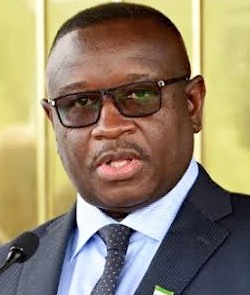 The Republic of Sierra Leone (or 'Sierra Leone' for short) is a small West African country bordering the North Atlantic ocean between the Republic of Liberia (to the Southeast) and the Republic of Guinea (to the north and east).The Republic of Sierra Leone has a total land area of about 71,740 squared kilometers (about 120sq km of which is covered by water) with about 402km of coastline.
The Republic of Sierra Leone (or 'Sierra Leone' for short) is a small West African country bordering the North Atlantic ocean between the Republic of Liberia (to the Southeast) and the Republic of Guinea (to the north and east).The Republic of Sierra Leone has a total land area of about 71,740 squared kilometers (about 120sq km of which is covered by water) with about 402km of coastline.
Just about 7.95% of the total land area of Sierra Leone remains arable (land good for farming).
The Republic of Sierra Leone has an estimated population of 8.2 million people with the population growth rate hovering around 2.3%. About 38% of Sierra Leone's population lives in urban areas in major cities and towns such as Freetown the capital. Freetown contains about 1.2 million people. Bo, the second most populous city in Sierra Leone, contains about 250,000 people. Followed by Kenema (another major city) with a population of about 220,000 people. Two other popular cities, Koidu and Makeni, are home to about 110,000 people and 130,000 people respectively.
The Republic of Sierra Leone despite its small population size, remains one of the most culturally rich countries in Africa today with a beautiful blend of several racial and ethnic groups living peacefully together.
Temne, the most populous ethnic group, makes up about 35% of the total population. The Mendes (another major group) form about 31% of the total population. The Limba and the Kono make up 8% and 5% of the total population respectively, followed by the Kriole who make up about 2% of the total population. Please note: Historically, the Kriole people are the direct descendants of freed Jamaican slaves who were settled in the Freetown area (known as Krio) in the late 18th century. The Mandingo and the Loko people together make up about 4% of the total population. The remaining fraction of the population consists of several other minor groups including the Koranko, the Yalunka, the Soso, the Fula, the Bullom, the Sherbro, the Krim, the Vai, the Gola, the Kissi, the several refugees from Liberia's civil war, Europeans, Indians, Lebanese, Pakistanis, etc.
Although English remains the official language, several other foreign and local languages including Mende, Temne and Krio are spoken in Sierra Leone today.
Islam remains the most dominant religious group in Sierra Leone today with about 70-80% of the population being Muslims. Christians make up just about 10-20% of the total population. Other religious groups including indigenous believers (mostly animists) make up the remaining fraction of the population.
The Republic of Sierra Leone just like its neighboring countries, is blessed with abundance of natural resources such diamonds, titanium ore, bauxite, iron ore, gold, chromite, etc. However, despite the abundance of natural and human resources, the Republic of Sierra Leone remains one of the poorest countries in Africa today.
Sierra Leone has a literacy rate of about 48.1% for the entire population (nb:Sierra Leone's literacy rate increased from 34.4% in 2004 to 48.8% in 2015 according to CIA facts) with the female literacy rate hovering around 37.7%. In other words, just about 37.7% of the total population of females above the age 15 living in Sierra Leone today can read and write which is one of the worst literacy rates in Africa today. Poor education remains a major problem in Sierra Leone and its neighboring countries.
The Republic of Sierra Leone remains one of the HIV/AIDS killing zones in Africa today with an HIV/AIDS adult prevalence rate of about 1.6%. According to official statistics, about 50,000 people were living with the disease in 2009 with about 3,000 deaths recorded within the same year. Besides the deadly HIV/AIDS, killer diseases such as Malaria, Ebola (Sierra Leone is now Ebola-free), bacterial and protozoal diarrhoea, yellow fever, etc. continue to threaten several lives in Sierra Leone today.
Deforestation or the rampant cutting down of trees for timber, land pollution (caused mainly by overpopulation, industrial runoffs and poor farming practices), water pollution (caused mainly by improper sewage disposals), etc. remain a major problem in Sierra Leone today.
Sierra Leone was in civil war between 1991 and 2002. The war destroyed several precious lives and properties and left Sierra Leone with nothing but absolute poverty and despair. The present peaceful atmosphere in Sierra Leone has helped the country a lot in almost all sectors of its economy. However, despite the significant improvements, illiteracy, poverty and hunger remain major challenges in Sierra Leone today.
According to a recent UNDP human development multidimensional poverty index MPI (developed by Oxford University), Sierra Leone is among the poorest countries in the world today with about 72.5 percent of its total population living in poverty. The multidimensional poverty index viewed poverty from several different angles rather than just the usual GDP figures. In addition to GDP figures, the Multidimensional Poverty Index also considered the deprivation of basic necessities such as education, food, water, etc.
According to the report, about 55.8 percent of the total population of Sierra Leone is multidimensionally poor with about 16.7 percent near multidmenional poverty. In other words, the 16.7 percent are somehow better than the 55.8 percent but are still poor. Also, about 46.6 percent of the population is 'severely' poor. In other words, about 46.6 percent of the total population of Sierra Leone is not just poor but extremely poor.
Just like in most other African countries today, corruption, illiteracy and poor governance continue to tear Sierra Leone apart.

Sierra Leonean author of "Combatting Wastefulness & COVID-19 Etc." available online via AMAZON1